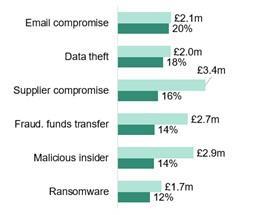A survey of European financial institutions found a lack confidence in their own internal risk management
Most European financial institutions lack confidence in their own internal risk management controls, according to new research.
Only 20% of the firms surveyed expressed high levels of confidence in their existing risk management processes.
According to the research by Ipsos almost all European financial institutions have reviewed their approach to risk since the onset of the global financial crisis but less than half have increased their spending on risk management.
While 87% felt that senior management now perceive risk management as more important, only 47% said that budgets for risk management expenditure were growing.
And 64% of the financial firms felt that their industry had been worst affected by the recession.
Carrick Lambert, industry practice leader for the Financial Institutions Practice in EMEA at Marsh, who sponsored the research, commented: ‘The global financial crisis revealed a breakdown of certain risk management controls in financial institutions. The results of our research demonstrate just how little confidence European financial institutions have in their current risk management procedures.’
‘Despite over four-fifths of respondents stating that their organisations are now reviewing their approach to risk, it is disappointing to note that ‘new thinking’ is not being backed up by financial investment in over half of the organisations surveyed. More money needs to be invested in risk management as business practices are fundamentally overhauled, which is crucial in terms of strengthening the overall risk management function and restoring stakeholder confidence.’
Risk and insurance professionals employed in over 120 financial institutions across Europe were interviewed.
Over two thirds (68%) said counterparty risk was one of the key challenges facing them at the moment. While insurers might be expected to be a greater cause of concern from a counterparty risk perspective, only 33% of participants were concerned about the risk associated with them. Among the steps they said were being taken to manage this risk were rigorous credit checks (33%), better communication (31%), stricter payment terms and conditions (25%).
Other key operational risks identified for the next 18 months included: Business continuity (58%), management liability (52%), legal risk (52%), fraud (44%), mergers and acquisitions (39%), outsourcing (37%), environmental risk (20%).
Charles Beresford-Davies, head of Marsh’s UK Financial Institutions Practice, said: ‘While most respondents were concerned about business continuity issues over the next 18 months, management liability and legal risks were also seen as priorities. In a downturn, legal action against directors and officers increases as people try to hold someone accountable for the chain of company failures, financial underperformance and lost jobs.’
‘In addition, nearly 45% of respondents rated fraud a significant concern over the next 18 months, both in relation to the global financial crisis and the fact that such activity is historically shown to increase during any period of economic downturn.’
He added: ‘This correlates with the recent experience of many of our own clients who are showing increased incidence of claims in areas such as mortgage fraud, breach of mandate allegations, mis-selling, Madoff-type events, shareholder disquiet and regulatory investigations. With all this evidence, it is our strong recommendation that all financial institutions review and update their risk management infrastructure.’
Marsh's recommended actions
Align the procurement of risk transfer solutions with business objectives and the associated risks.
Many financial institutions have not made an explicit link between the purchase of insurance and risk management. Financial institutions must develop closer working relationships that allow co-development of risk models and integration of risk management efforts.
Make the risk function more visible.
Risk managers now have the opportunity to take a more active role in improving company performance. Financial institutions can strengthen their risk management in key areas by allowing the risk function to being more involved in strategic decision-making.
Drive cost savings and reduce the total cost of risk.
Financial institutions need to be more definite about what risks are transferable and then allocate insurance spending or implement controls in the most cost effective way. This is achieved through due diligence and performing additional analysis of risk trend data.



















No comments yet